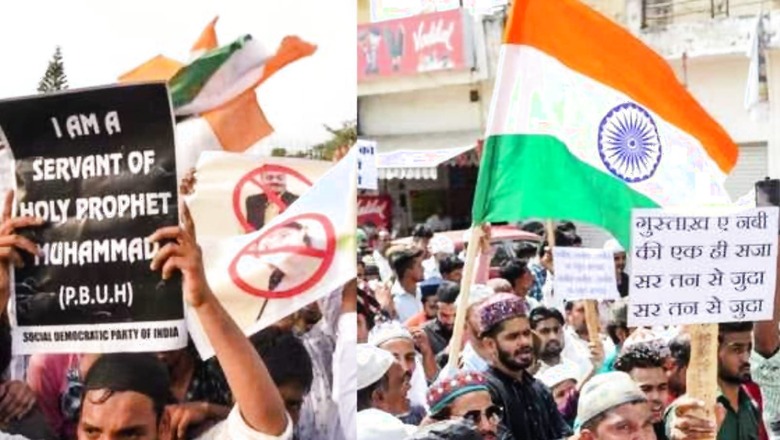
views
During the recent tirade in India over the Prophet remarks, the Pakistan-origin death slogan — ‘Sar Tan Se Juda’ — gained fame among the protest rallies. The slogan is often weaponised by Islamists to declare the permissibility of beheading the blasphemers.
The country’s National Commission for Protection of Child Rights (NCPCR) last Wednesday had to take notice of the videos circulating on social media where teenagers and kids were seen raising the slogans in Hyderabad during protests against Raja Singh’s derogatory remarks on the Prophet.
The way it is getting normalised in India, it is important to analyse the history of the slogan, and how it crept into the country. It is also incumbent to verify whether the slogan has valid credibility as per the Quran and Sunnah, or it is just a political weapon.
How did it start?
The radical Barelvi terror outfit Tehreek-e-Labbaik Pakistan (TLP) magnified the slogan among the masses of Pakistan in 2011 to shield Mumtaz Qadri — the assassin of Punjab’s governor Salman Taseer, who was accused of committing blasphemy against the Prophet of Islam.
The then TLP’s chief Moulana Khadim Hussain Rizvi called out “Man Sabba Nabiyan Faqtolohu” — “Whoever Insults a Prophet, Kill him”. He would then raise a question to the audience during the mass demonstrations, “Gustakh-e-Rasool ki Ek hi Saza?” — “What’s the only punishment for the Blasphemer?” The protestors would respond by chanting “Sar Tan Se Juda, Sar Tan Se Juda”.
Later, his followers normalised the slogan through high-quality YouTube videos, along with the sounds of swords and visuals of Turkish drama Ertugrul Ghazi. Interestingly, such videos remain on YouTube with millions of views.
Though Pakistan’s Parliament has a special blasphemy law, 95 per cent of the killings in the name of blasphemy were carried out by the public.
In total, 89 people have been killed in Pakistan since 1948 until 2021 for blasphemy — among them, most were Sunni Muslims and only one was a Hindu.
According to the Executive Director of Islamic Theology of Counter-Terrorism (ITCT) London Mr. Noor Dahri, “Sufism is an ideology, and it’s a non-political ideology around the world. Barelvi Sunni Tehreek started in 1990s as an armed militant group. Some of them were created by Pakistan for the conflict in Kashmir”.
Dahri said: “Most of the victims of Barelvi extremism are Muslims themselves. After the creation of Pakistan, the communal hatred later converted to sectarian hatred.”
How did it creep into India?
Majority of the Muslim population in India follows the Barelvi school of thought. To give the saint the due, most of the followers of this thought process are non-violent and regular Muslims who struggle with the day-to-day challenges of life, along with their fellow citizens.
The concept of ‘Sar Tan Se Juda’ was alien to these adherents.
In the early 2000s, Pakistani channels like Q-TV and Dawat-e-Islami’s Madani TV gained popularity among the Indian Muslims, obviously for their finest production of Naat programmes and Islamic orientation lectures.
The people could immediately connect themselves with the language and the discourses, which gradually led to a huge fan base.
However, it also raised the competition. Later, Mumbai’s runaway preacher Dr. Zakir Naik played a pivotal role in introducing Pakistan’s radical Muslim Brotherhood Mullah Dr. Israr Ahmed to his fans through his Peace TV.
The fact of the matter is that whether Barelvi or Muslim Brotherhood, the common trait among these groups was the ultra-Pakistani nationalism combined with a stealthy Hinduphobic and anti-India attitude.
Over time, these preachers and organisations became Pakistan’s soft-power to produce Islamists across the border.
This cross-border Islamic narrative left an enormous impact on the naive learners in India. It started producing and influencing Islamists — some serious and some superficial and also led to physical visits and personal invitations.
Dr Israr Ahmed, who is infamous for his anti-Semitic conspiracy theories and the ‘Ghazwa-e-Hind’ predictions, was warmly welcomed in India on a six-day tour in December 2004 by the prominent personalities of Jamaat-e-Islami.
The murderers of Kanhaiya Lal Teli, Ghous Mohammed and Riyaz Attari, were invited by senior functionaries of Barelvi radical group Dawat-e-Islami to Pakistan in 2014. Attari played smart and tried to infiltrate into the minority wing of Rajasthan’s BJP. Eventually, the relationship was unearthed after they were involved in the murder of Kanhaiya for allegedly supporting Nupur Sharma.
Now, in 2022, the Indian counter-terrorism experts and political scientists are appalled to hear and watch the slogans of death and beheadings in India, which have echoed in the streets of Pakistan for the past seven decades.
Does Islam Endorse Beheading Those Who Insult the Prophet?
“Whoever Insults a Prophet, Kill Him” — is a fabricated hadith falsely attributed to the Prophet. This narration is largely weaponised by Islamist propagandists to target their political opponents.
In fact, American Muslim Scholar Moosa Richardson — who studied from Saudi Arabia’s Umm al-Qura University in Makkah and later under prominent scholars like Shaykh Rabee Al-Madkhali — made a detailed research to verify whether this statement was really said by Prophet Mohammed.
In the technical terminology, he mentioned, “With the wording, ‘Whoever insults the prophets…’ it was collected by at-Tabaraanee in his al-Mu’jam al-Awsat and al-Mu’jam as-Sagheer, with Ubaydullaah ibn Muhammad al-Umaree in the chain, a man whom the scholars of hadith identify as a liar”.
In short, Richardson’s research means the narrator of the hadith was a known liar to the scholars of his time.
According to Richardson, disrespecting the Prophet is a crime in Muslim nations and may even result in the death penalty in some circumstances. However, this does not give Muslims the right to defend those who violate the law by acting as judges, juries, or executioners without following the correct processes.
Richardson also highlighted that the Islamists and the dreadful terrorists who are referred to as ‘Khawarij’ have falsely attributed this to the Prophet.
When the Delhi-based scholar and President of Abul Kalam Azad Islamic Awakening Center Moulana Mohammed Rahmani was asked last week about the ‘Sar Tan Se Juda’ attitude, he out-rightly replied: “Such slogans are not even entertained in the Islamic countries, how can we allow it in India? Such slogans are absolutely Un-Islamic”.
It’s as plain as day that ‘Sar Tan Se Juda’ has no Islamic credibility and is merely a cat’s paw to claim victimhood and exacerbate the political frenzy.
The government should be wary about the way the slogan is getting normalised with every new event. At the same time, authorities and media should also take care about possible provocations and reactionary comments that lead to such regrettable incidents.
Read all the Latest Opinion News and Breaking News here


















Comments
0 comment